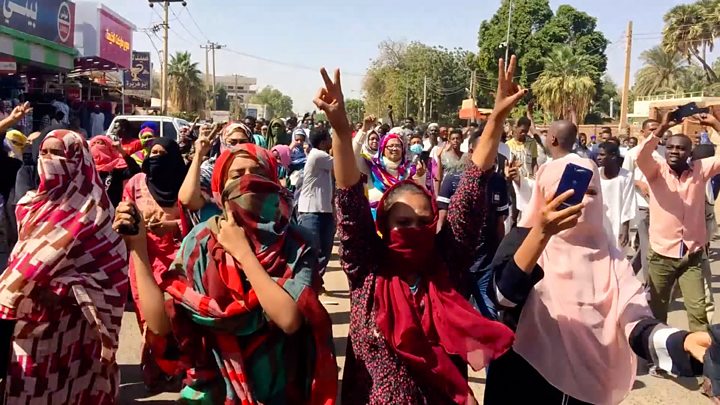Organisers of mass protests in Sudan have told the BBC they want the full dismantling of the "deep state" left behind by ousted leader Omar al-Bashir.
A spokesman said leaders of the past regime should be put on trial.
Mr Bashir was toppled by the army last week after 30 years in power and a military council has pledged elections in two-years time.
But protesters remain camped outside army HQ in the capital, Khartoum, demanding a civilian administration.
Reports on Monday said there had been efforts to break up the sit-in. Details are sketchy but witnesses said troops had stepped back from immediate confrontation.
On Sunday the transitional military council sought to appease protest leaders, telling them that key figures from the former government had been arrested. It is not clear who those officials are.
A military spokesman also promised not to disperse protesters and said the council was "ready to implement" whatever civilian government the opposition parties agreed.
In another development, 13 people were reportedly killed in an armed attack on protesters in the troubled region of South Darfur over the weekend.
The privately-owned Darfur 24 news website said "gunmen" had attacked the anti-government protest at a camp for displaced people about 17km (10 miles) east of the regional capital, Nyala.
Mr Bashir has been indicted on charges of war crimes and crimes against humanity in Darfur by the International Criminal Court. He denies any wrongdoing.
What are protest leaders demanding?
Amjad Farid, of the Sudanese Professionals' Association (SPA) which has spearheaded protests, told the BBC that they "completely rejected" the military council currently leading Sudan.
He said demands included the "full dissolution of the deep state" and the dismantling of state intelligence agencies.
Opposition politician Mubarak al Fadil told the BBC that the role of the military should decrease over time.

Media playback is unsupported on your device
"There could be two transitional periods," he said. "A first transitional period that would continue for six months where the military transitional council will continue to be the sovereign [power] and accomplish a number of important missions and tasks that is needed to clear the ground, and then the rest of the transitional period - which is a year and a half - could be presided over by a presidential council that would have a military representation within it."
Meanwhile, protesters in Khartoum remained in defiant mood.
"We are here to remove the entire system, a system that does not give service equally to the people," Mohammed Jakur told AFP news agency. "A system that leave[s] people under poverty. A system that does not allow Sudan, as a rich country with human and natural resources, to act as any other country in the world."
What has the military said?
In a news conference on Sunday, spokesman Maj Gen Shams Ad-din Shanto said the military council was "ready to implement" whatever civilian government the opposition parties agreed.
"We won't appoint a PM. They'll choose one," he said.
He also said the army would not remove protesters from their sit-in by force, but called on the crowds "to let normal life resume" and stop unauthorised roadblocks.
"Taking up arms will not be tolerated," he added.
The military council also announced a raft of decisions, including:
- New heads of the army and the police
- A new head of the powerful National Intelligence and Security Service (NISS)
- Committees to fight corruption, and to investigate the former ruling party
- The lifting of all media restrictions and censorship
- The release of police and security officers detained for supporting protesters
- A review of diplomatic missions, and the dismissal of Sudan's ambassadors to the US and to the UN in Geneva
What's the background?
Protests began in December over a steep rise in the cost of living but soon developed into a wider call for the removal of Mr Bashir and his government.
Then last Thursday the military removed and detained the veteran leader after nearly 30 years in power.
Coup leader Defence Minister Awad Ibn Auf announced the military would oversee a two-year transitional period followed by elections and imposed a three-month state of emergency.
But demonstrators vowed to stay on the streets unless there was an immediate switch to civilian government.
Mr Ibn Auf himself stood down the next day, as did the feared security chief Gen Salah Gosh.
Lt Gen Abdel Fattah Abdelrahman Burhan was then named as head of the transitional military council, to become Sudan's third leader in as many days.
In a televised address on Saturday, Gen Burhan vowed to "uproot the regime", pledging to respect human rights, end a night curfew, release political prisoners immediately, dissolve all provincial governments, try those who had killed demonstrators and tackle corruption.
Mr Bashir's whereabouts are unknown, but military leaders said he was in a secure place.
The military council has said it will not extradite him to face accusations in the International Criminal Court, although he could well be put on trial in Sudan.
https://www.bbc.com/news/world-africa-47933742
2019-04-15 09:55:04Z
52780269134185
Tidak ada komentar:
Posting Komentar